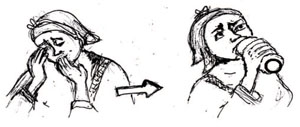Self-Assessment Questions (SAQs) for Study Session 10
Now that you have completed this study session, you can assess how well you have achieved its Learning Outcomes by answering these questions. Write your answers in your Study Diary and discuss them with your Tutor at the next Study Support Meeting. You can check your answers with the Notes on the Self-Assessment Questions at the end of the Module.
First read Case Study 10.1 and then answer the questions that follow it.
Case Study 10.1 Mrs Chaltu’s story
Mrs Chaltu is a 30-year-old woman living on the outskirts of Adama city. She went to Adama when she was 20 after a hasty marriage to a man she had known only briefly. The family were not happy with the marriage, believing that a longer engagement would have been more appropriate. Lacking support from the family, the marriage has proven difficult and her husband has struggled to sustain paid employment. Mrs Chaltu has become more worried about her life and future in general. They do not have any children and this is a source of sadness to Mrs Chaltu.
Recently, her elder sister – whom she loves very much – told her she was going to visit. They had not seen each other for two years because they live far away from each other, the bus journey takes several hours. Mrs Chaltu was very excited about seeing her sister, but when she was preparing the house before going to the bus station, she received a phone call from her sister saying she could not come because of some personal difficulties. Chaltu was so upset by this that she picked up the berekina (chlorinated bleaching liquid) she was using to clean the house and began drinking it. Chaltu was found by her husband before she had drunk very much of the liquid, and she received prompt medical treatment which saved her life.

SAQ 10.1 (tests Learning Outcomes 10.1, 10.2 and 10.3)
Describe the main symptoms that Mrs Chaltu presents with and identify to which priority mental health disorder(s) they are likely to relate.
Answer
Mrs Chaltu seems unhappy and sad, and worried about her life and her future. Her sadness could be an indication of depression. Depression is a priority mental health disorder. After her sister could unexpectedly not visit her, Mrs Chaltu tried to end her own life by drinking Berekina. Suicide is also included in the list of priority disorders.
SAQ 10.2 (tests Learning Outcomes 10.4 and 10.5)
What more do you need to know about Mrs Chaltu before you can assess the level of suicide risk more accurately? Describe some of the questions you would ask Mrs Chaltu to try to assess the level of future risk of self-harm or suicide.
Answer
There are several aspects that you need to know more about before you can assess the level of suicide risk more accurately:
- You need to know more about the incident of self-harm. It seems that it was not a pre-planned suicide attempt, but you need to establish whether the Berekina drinking was a serious attempt at suicide and how she feels about this now. To understand more about this, you could ask questions such as: ‘what did you think would happen when you drank Berekina?’ ‘How much of it did you take?’ ‘Did you believe the amount you took would kill you?’
- You need to find out if there is any past history of self-harm. If she has such a history, the risk of future suicide is greater. You can assess this by asking questions such as: ‘Have you ever tried to harm yourself before?’
- You need to know more about whether Mrs Chaltu has suicidal thoughts more often. You can assess this by asking general questions about how she sees the future, and more direct questions such as, ‘Are there times when you wish you were dead?’(See also Box 10.5).
- You need more details about Mrs Chaltu’s social circumstances. It appears that Mrs Chaltu has some social problems, including family problems and financial worries. You can get to understand Mrs Chaltu’s situation better by asking her questions like: ‘Are there things in life that you worry about?’ ‘Do you have enough support from family and friends?’
Summary of Study Session 10
